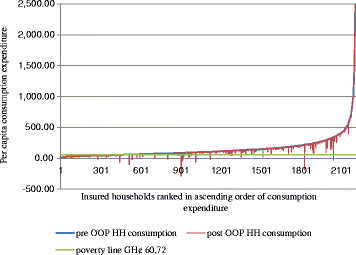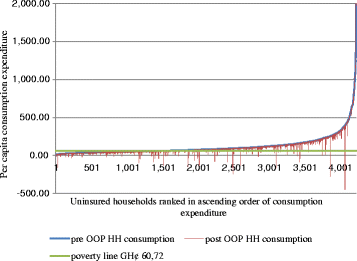Can health insurance protect against out-of-pocket and catastrophic expenditures and also support poverty reduction? Evidence from Ghana's National Health Insurance Scheme
- PMID: 27449349
- PMCID: PMC4957846
- DOI: 10.1186/s12939-016-0401-1
Can health insurance protect against out-of-pocket and catastrophic expenditures and also support poverty reduction? Evidence from Ghana's National Health Insurance Scheme
Abstract
Background: Ghana since 2004, begun implementation of a National Health Insurance Scheme (NHIS) to minimize financial barriers to health care at point of use of service. Usually health insurance is expected to offer financial protection to households. This study aims to analyze the effect health insurance on household out-of-pocket expenditure (OOPE), catastrophic expenditure (CE) and poverty.
Methods: We conducted two repeated household surveys in two regions of Ghana in 2009 and 2011. We first analyzed the effect of OOPE on poverty by estimating poverty headcount before and after OOPE were incurred. We also employed probit models and use of instrumental variables to analyze the effect of health insurance on OOPE, CE and poverty.
Results: Our findings showed that between 7-18 % of insured households incurred CE as a result of OOPE whereas this was between 29-36 % for uninsured households. In addition, between 3-5 % of both insured and uninsured households fell into poverty due to OOPE. Our regression analyses revealed that health insurance enrolment reduced OOPE by 86 % and protected households against CE and poverty by 3.0 % and 7.5 % respectively.
Conclusion: This study provides evidence that high OOPE leads to CE and poverty in Ghana but enrolment into the NHIS reduces OOPE, provides financial protection against CE and reduces poverty. These findings support the pro-poor policy objective of Ghana's National Health Insurance Scheme and holds relevance to other low and middle income countries implementing or aiming to implement insurance schemes.
Keywords: Catastrophic expenditure; Ghana; Health insurance; Out-of-pocket expenditure; Poverty reduction.
Figures
Similar articles
-
Does the National Health Insurance Scheme provide financial protection to households in Ghana?BMC Health Serv Res. 2015 Aug 15;15:331. doi: 10.1186/s12913-015-0996-8. BMC Health Serv Res. 2015. PMID: 26275412 Free PMC article.
-
Does insurance protect individuals from catastrophic payments for surgical care? An analysis of Ghana's National Health Insurance Scheme at Korle-Bu teaching Hospital.BMC Health Serv Res. 2020 Jan 17;20(1):45. doi: 10.1186/s12913-020-4887-2. BMC Health Serv Res. 2020. PMID: 31952520 Free PMC article.
-
Evaluating the impact of the national health insurance scheme of Ghana on out of pocket expenditures: a systematic review.BMC Health Serv Res. 2018 Jun 7;18(1):426. doi: 10.1186/s12913-018-3249-9. BMC Health Serv Res. 2018. PMID: 29879978 Free PMC article.
-
Assessing the catastrophic effects of out-of-pocket healthcare payments prior to the uptake of a nationwide health insurance scheme in Ghana.Glob Health Action. 2017;10(1):1289735. doi: 10.1080/16549716.2017.1289735. Glob Health Action. 2017. PMID: 28485675 Free PMC article.
-
Assessing equity in health care through the national health insurance schemes of Nigeria and Ghana: a review-based comparative analysis.Int J Equity Health. 2013 Jan 22;12:9. doi: 10.1186/1475-9276-12-9. Int J Equity Health. 2013. PMID: 23339606 Free PMC article. Review.
Cited by
-
Effects of expanding a non-contributory health insurance scheme on out-of-pocket healthcare spending by the poor in Turkey.BMJ Glob Health. 2019 Aug 31;4(4):e001540. doi: 10.1136/bmjgh-2019-001540. eCollection 2019. BMJ Glob Health. 2019. PMID: 31543988 Free PMC article.
-
Variation in financial protection and its association with health expenditure indicators: an analysis of low- and middle-income countries.J Public Health (Oxf). 2022 Jun 27;44(2):428-437. doi: 10.1093/pubmed/fdab021. J Public Health (Oxf). 2022. PMID: 33890116 Free PMC article.
-
Access to cardiovascular medicines in low- and middle-income countries: a mini review.Glob Health Res Policy. 2023 May 23;8(1):17. doi: 10.1186/s41256-023-00301-6. Glob Health Res Policy. 2023. PMID: 37221559 Free PMC article. Review.
-
Toward mandatory health insurance in low-income countries? An analysis of claims data in Tanzania.Health Econ. 2022 Oct;31(10):2187-2207. doi: 10.1002/hec.4568. Epub 2022 Aug 7. Health Econ. 2022. PMID: 35933731 Free PMC article.
-
Sociodemographic patterns of health insurance coverage in Namibia.Int J Equity Health. 2019 Jan 22;18(1):16. doi: 10.1186/s12939-019-0915-4. Int J Equity Health. 2019. PMID: 30670031 Free PMC article.
References
-
- Krishna A. Escaping poverty and becoming poor: who gains, who loses and why? World Dev. 2004;32(1):121–136. doi: 10.1016/j.worlddev.2003.08.002. - DOI
MeSH terms
LinkOut - more resources
Full Text Sources
Other Literature Sources
Medical



